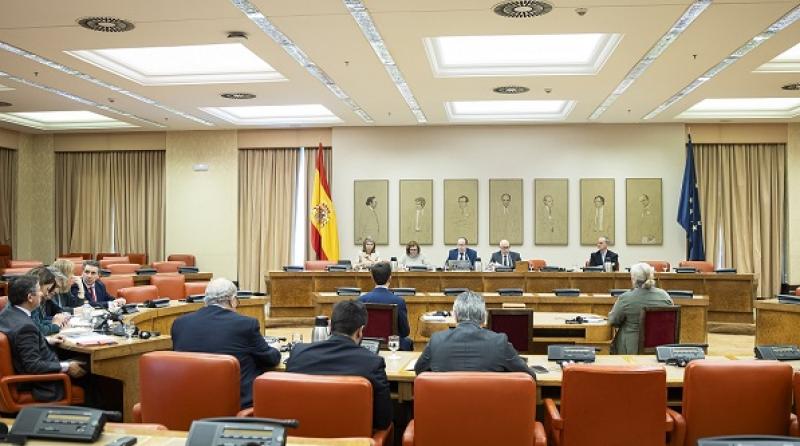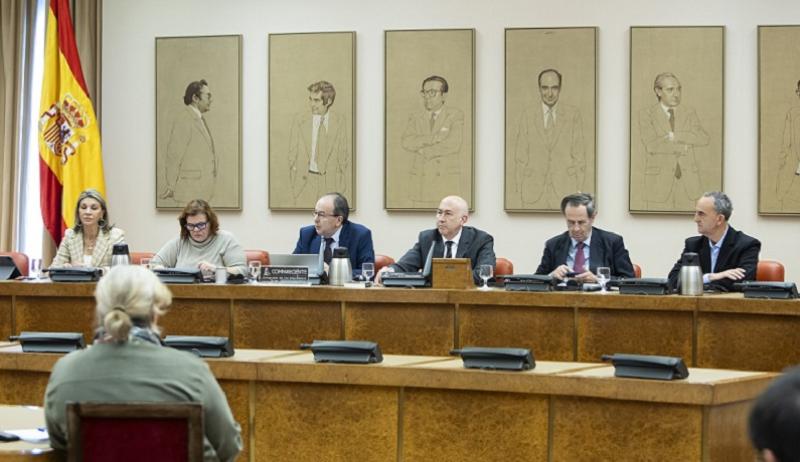The President of the Council for Transparency and Good Governance (CTBG), José Luis Rodríguez Álvarez, appeared yesterday at his own request in the Finance and Public Function Committee of the Congress of Deputies to present the Report of Activities of the Council for the financial year 2022, which had been pending due to the early dissolution of the Cortes Generales.
It was an important year, he explained, in the evolution of the Council towards its consolidation as an independent administrative authority guaranteeing transparency and the right of access to public information in which several challenges of transformation and modernization of the institution were addressed. He highlighted the intense activity developed by a modest staff with a high level of performance, referring in his speech, above all, to the two main functions of the Council: the protection of the right of access to public information and the evaluation of compliance with the obligations of active publicity that the law imposes on obliged subjects, mostly public administrations.
In relation to the processing and resolution of complaints regarding access to information, the CTBG resolved in 2022 a total of 1,652 complaints, 997 of them at the state level and 655 at the autonomous and local level of those CC.AA. which have conferred on the Council the power to resolve these dossiers at territorial level.
Then, Rodríguez highlighted two issues that “reflect many other dysfunctionalities in the management of requests for access to public information.”
On the one hand, the large number of cases in which the obligated subjects do not respond in time to requests for public information, which are therefore rejected by administrative silence. Approximately one third of the complaints at the state level and up to three thirds at the level of local and regional administrations processed by the Council are submitted for this reason. Although at the state level, in slightly more than half of these cases the information is finally granted during the processing of the claim - after the intervention of the Council - "it is still an administrative practice very criticizable for different reasons: because the applicant is forced to claim in order to see his right effectively recognized, because public resources are consumed unnecessarily and because, in many cases, the delay in providing the information generates a loss of value of the same".
On the other hand, he stressed the excessive frequency with which the causes of non-admission provided for in article 18 of the Transparency Act are invoked, often unjustifiably, “as an easy remedy to avoid the greater argumentative complexity required by the application of the limits of articles 14 and 15 of the Act, which require a reasoned weighting of the damage and of the public or private interest in access and a sufficient and clear justification of the proportionality of the refusal.”
The president of the CTBG also drew attention to the fact that, although the percentage of Council resolutions that are not complied with has been reduced (7% at the state level according to the latest consolidated data compared to 11.25% of resolutions that were not complied with in 2020), this practice remains unacceptable “because there are no reasons to justify that certain organs of administration leave without executing firm administrative resolutions that legally bind them.” In his opinion, this fact constitutes “the greatest anomaly in the functioning of the Spanish system of access to public information”, for which the Law on Transparency, Access to Public Information and Good Governance (LTAIGB) does not provide any remedy, a shortcoming that must be addressed in the future reform of the norm.

Regarding the work on the evaluation of active publicity obligations, which the Council carries out using MESTA, the Council’s own methodology, he stressed that it contributes to improving the level of transparency of the different institutions and entities. There is an optimal degree of compliance with transparency obligations in constitutional bodies, regulators, supervisors and independent administrative authorities. The AGE Transparency Portal, although it has improved significantly, still has shortcomings; and among the entities that make up the institutional public sector there are large differences ranging from 6% to 100% compliance. Finally, in private entities bound by the law, there is a high degree of ignorance of their obligations of active publicity, so in 2024 and 2025 the actions of the Council will focus on these last two groups.
In addition, José Luis Rodríguez dealt with other issues directly related to the current situation of the Council of Transparency and Good Governance: he highlighted on the one hand the recent increase in the staff, made up today of 32 people, although still far from what would be necessary to address the Council’s workload. He also stressed the changes introduced in the functioning of the Council, such as the full digitization of its procedures. However, he recalled, there are pending issues, such as the modification of its organizational structure to adapt it to that of an independent administrative authority, for which the approval of a new Statute of the Council will be necessary, which may occur in the coming months.
He also referred to the aforementioned future reform of the LTAIGB, which is due to take place in this legislature, and which must include, in his opinion, the express attribution of at least three powers for the Council to carry out its functions effectively: that of requesting the full file of the requests claimed; that of examining (with all the necessary guarantees of reservation) the content of the information claimed when there are indications that a limit or a cause of inadmissibility is unjustifiably invoked, and finally, coercive powers to oblige compliance with the resolutions of the Council. In his view, the possibility of imposing coercive fines would be the most effective solution, without prejudice to establishing a sanctioning regime for the most serious cases.
Finally, the delegation valued the ten years of validity of the transparency law in Spain: “The progress made is very relevant but much remains to be done; we are at an intermediate stage in the construction of our public transparency system.” He stressed that the reform of the law will be key, but also “more energetic public policies to promote a culture of transparency in public administrations and provide sufficient means both to the guarantor bodies of transparency (the state and the autonomous ones) and to the administrations themselves and other subjects obligated to be able to comply with the law.” “This legislature is decisive in consolidating our system of transparency and placing Spain in its rightful place as an advanced democracy,” he concluded.
José Luis Aceves, new member of the Committee on Transparency and Good Governance
The Commission’s agenda also included the proposal and vote of the member representing the Congress in the Transparency and Good Governance Commission, a collegiate body made up of a president (the CTBG) and seven members. The Finance and Public Service Commission appointed the deputy José Luis Aceves Galindo.
Pictures: Congress of Deputies

